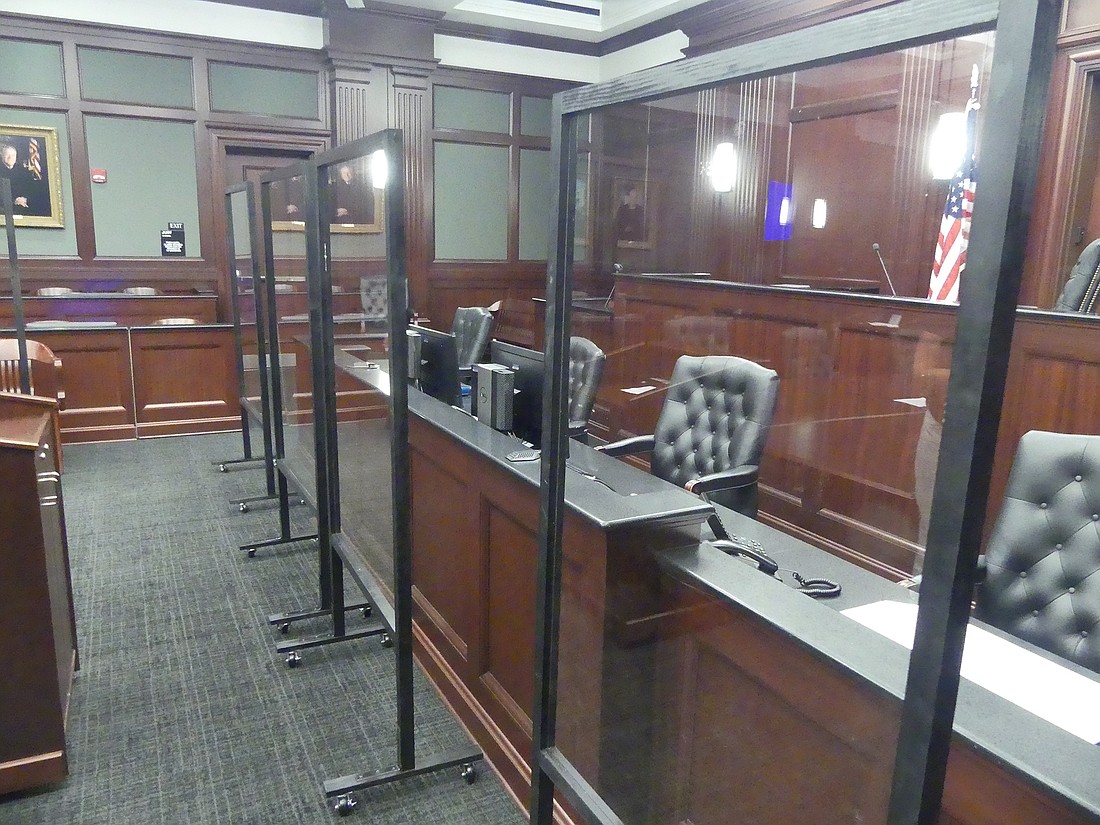
By Randall Richardson • Assistant Regional Conflict Counsel
As the old legal maxim goes: “Justice delayed is justice denied.” To that end, courts across the state of Florida are slowly but surely resuming trials.
Having tried two cases recently, I can testify that things have changed because of COVID-19. Local courts are doing everything in their power to ensure everyone in the courtroom is safe through adherence to the guidelines set forth by the state Supreme Court.
While these protections are critical for safety, the implementation can cause a host of issues for the attorney-client relationship, communications and body language signals for the jury.
In practicality, adhering to the guidelines means a lot of plexiglass, wearing a mask and practicing social distancing.
Each of these accommodations impacts communicating with your client, connecting with the jury and presenting your case.
Upon walking into a courtroom, the first thing one notices is that there is plexiglass everywhere – in front of the jury box, in front of the podium and on the conference tables. While it is needed for stopping disease spread, it is less than ideal for confidentially communicating with your client.
Add to that having to talk through a mask and being 6 feet apart, having a quiet, confidential conversation with your client is nearly impossible.
As any trial lawyer will tell you, connecting with the jury is essential if you want to be successful at trial. Plexiglass, masking and social distancing make this a difficult task.
There’s a barrier between the attorney and the jury, both mentally and physically. Imagine trying to convey your message with a wall standing between you and the jury. It’s a transparent wall but still a barrier, nonetheless.
Wearing a mask is another obstacle to connecting with the jury. A jury constantly looks at an attorney’s or their client’s facial expressions when determining who to believe. A mask prevents juries from seeing those expressions that are critical to making credibility findings.
The same problem exists with jury selection. In voir dire, it is not always what the juror says, but how they say it. A juror wearing a mask answering you might say “yes,” but his face could be saying “no.”
Also, because jurors are sometimes so far from the attorneys, there may be a perception that the attorneys are yelling at them, which impacts crucial first impressions. Each one of these issues is by itself problematic and can make connection with the jury more difficult.
Finally, the safety guidelines can make an attorney’s presentations less compelling. Imagine an attorney trying a case behind a plexiglass wall, wearing a mask and confined to a small space to ensure social distancing. Each one of these presents a physical and psychological barrier.
An attorney having to stay behind plexiglass affects how evidence is presented to the jury. Wearing a mask can take away the inflection in an attorney’s voice, which is vital when stressing essential points to the jury.
Being confined to the podium to comply with social distancing can impact the effectiveness of an attorney’s opening and closing arguments.
The 6th Amendment to the U.S. Constitution guarantees each individual the right to effective representation. It is safe to say that COVID-19 has challenged this guarantee.
Effective representation is possible during these trying times. However, it takes careful planning and execution to ensure that the obstacles do not affect the client’s representation.
Hopefully, as more people are vaccinated, and the courts transfer into the subsequent phases, these restrictions will not be needed.
Randall Richardson is an attorney with Regional Conflict Counsel, 1st District Court of Appeal.